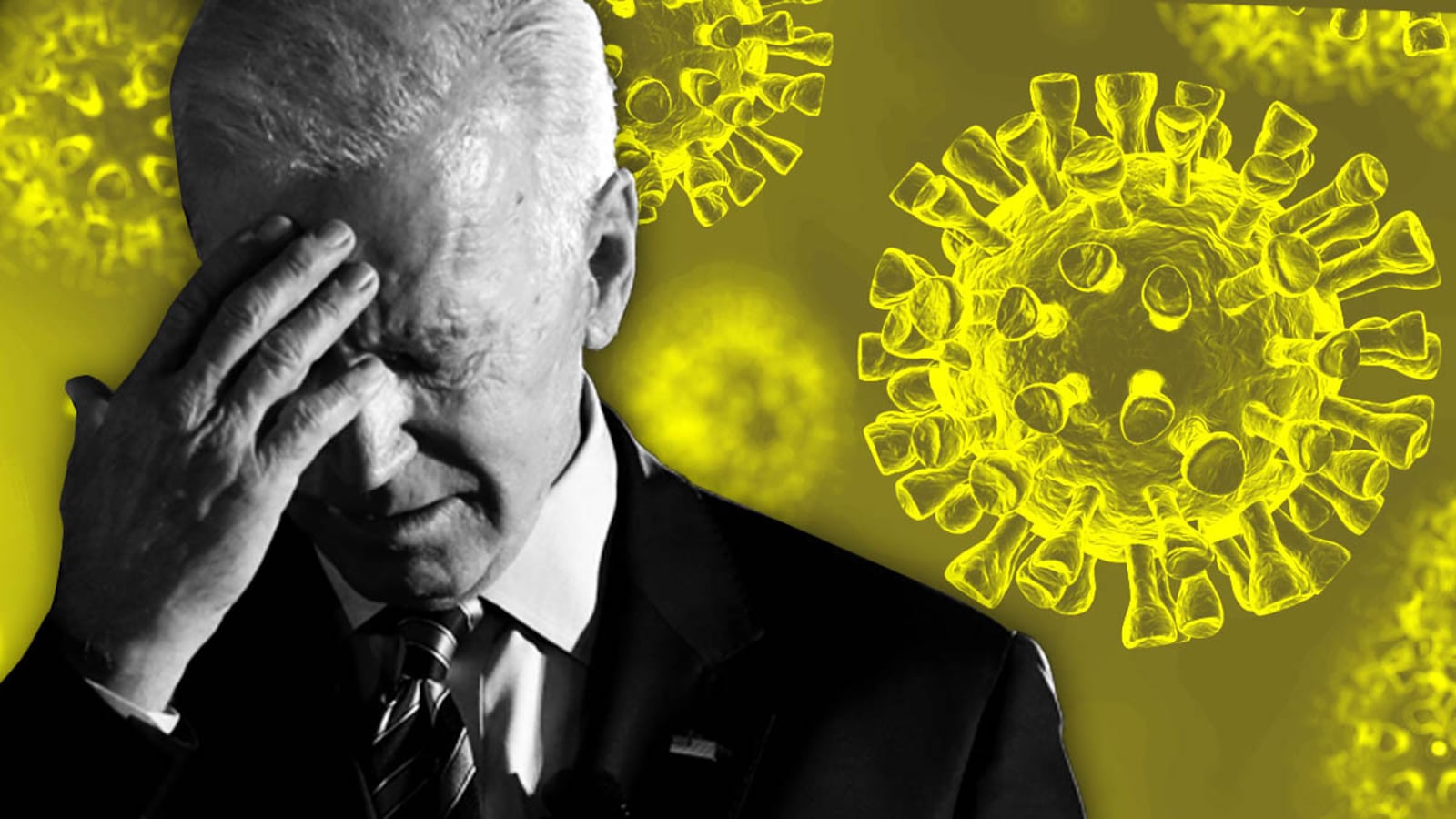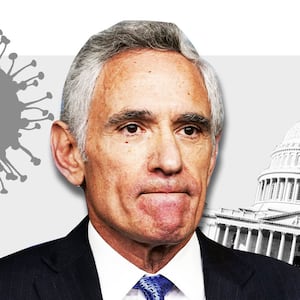President-elect Joe Biden says he’s developed a playbook for how to mitigate the threats of the coronavirus. But Donald Trump is president for 72 more days, and health officials say his mere presence in the West Wing is likely to impede any effort to substantially control the burgeoning crisis before January.
Trump will likely not engage in containment measures in any new, meaningful way until a vaccine becomes available, three senior health officials said. Pfizer announced on Monday that its vaccine had been 90 percent effective and showed no side effects in trials. The company plans to ask the Food and Drug Administration for emergency authorization later this month and said it could produce doses to immunize up to 20 million people by the end of the year.
But if the virus continues to spread throughout the country without serious federal intervention until a nationwide vaccine is rolled out, Biden could inherit a significantly more dire COVID-19 crisis.
“We still have a couple of long months ahead of us,” one senior health official said. “Cases will continue to rise and deaths will follow. What we need is to get the message out to Americans to take this next wave just as seriously as they did the first. But I don’t see White House messaging changing.”
Warnings from officials come as the president and his team of advisers continue to downplay the threats posed by the virus. They’ve suspended task force meetings and embraced the idea that nothing more can be done to stop the spread before a viable vaccine becomes available. Coupled with the president’s disinterest in addressing the virus, his sidelining of top health experts and constant dismissal of warnings of a third wave will likely allow the virus to proliferate in the next two months. In a memo, first obtained by The Washington Post, Dr. Deborah Birx, the White House task force coordinator, said the U.S. was “entering the most concerning and most deadly phase of this pandemic.”
Despite serious warnings from doctors and scientists about the skyrocketing cases, health officials are convinced that in the coming months the president will place less emphasis on saving Americans than on winning his election legal battles across the country. Officials say Americans will ultimately have to lean on local leaders rather than federal officials as the virus spreads this fall and winter. But without federal help—financing and distribution of medical supplies from the national strategic stockpile—states could face another round of shortages.
States across the country are already operating in emergency mode. This past week alone, more than 1.3 million Americans were infected with the coronavirus and more than 12,300 died as a result. North Dakota, South Dakota, and Wisconsin continue to see large spikes in infection, hospitalization, and death rates. And states such as Indiana, Arkansas, and Illinois are experiencing rapid community spread with the virus replicating rapidly and infecting thousands of people.
“As we move past election week… we urgently need action plans to address accelerating infection rates and compromised contact tracing that may soon irreversibly make our country vulnerable to a long, dark winter,” warn doctors and researchers working at PolicyLab at Children’s Hospital of Philadelphia. PolicyLab has advised the White House coronavirus task force throughout the pandemic.
On Monday, President-elect Biden introduced his slate of advisers and experts to address the pandemic. They include Rick Bright, a federal vaccine expert, who became a whistleblower when he accused the Trump administration of firing him because of his dire predictions about the pandemic. According to a statement issued by the Biden transition team, the Transition COVID-19 Advisory Board will be led by experienced co-chairs former Food and Drug Administration Commissioner Dr. David Kessler, former Surgeon General Dr. Vivek Murthy, and Dr. Marcella Nunez-Smith, associate professor of medicine and public health at Yale.
Biden has vowed to start tackling COVID-19 before he gets to the Oval Office by launching a campaign to help communities contain an alarming number of new positive cases and deaths.
“I will spare no effort—none—or any commitment to turn around this pandemic,” Biden said in his victory speech Saturday night in Wilmington, Delaware.
That nationwide effort will be led by a task force of the president-elect’s own choosing—a group of established doctors, scientists, and policymakers who will focus on connecting directly with local leaders to determine what states need to battle the cresting coronavirus wave, including funding and supplies and personal protective equipment. The task force will also draw up an “action blueprint,” as the president-elect has described it, to map out a new framework for containing the spread of the virus through stricter mask and social distancing guidelines.
Biden’s formal COVID-19 plan includes a long list of goals, including communicating more frequently with state and local officials, ramping up testing, bringing back the White House National Security Council office on biodefense, and expanding surveillance programs, and invoking the Defense Production Act to produce medical supplies and personal protective equipment. As The Daily Beast previously reported, the root of Biden’s vision for getting the virus under control rests on whether Americans trust him. If Biden himself follows public health guidelines, encircles himself with the nation’s leading experts on infectious diseases, and allows health agencies to brief the public frequently on the latest COVID-19 data, the thinking goes, then Americans will follow.
Individuals familiar with the matter say Biden is planning on garnering that trust by encircling himself with some of the best doctors and scientists in the country. His COVID-19 task force will include co-chairs Vivek Murthy, the former surgeon general, former Food and Drug Administration Commissioner David Kessler, Dr. Marcella Nunez-Smith from Yale University, former Chicago Health Commissioner Dr. Julie Morita, Dr. Celine Gounder from New York University, and Zeke Emanuel, head of the Department of Medical Ethics and Health Policy at the University of Pennsylvania. Emanuel also served as a special adviser in the Obama White House. Politico was the first to report on the members of the Biden COVID team.
But it’s unclear to what extent, if any, Biden’s team will be able to influence guidance and policy while Trump, who has no real plan for the fall and winter, remains in office.
Complicating the entire Biden task force process is the near certainty that top Trump administration health officials will depart before Biden’s inauguration. Trump is likely to oust some. According to another senior administration official, some health officials are said to be thinking about leaving on their own.
Beyond dealing with the ever evolving bureaucratic appointment process, Biden’s task force will fight a major uphill battle over the next two months: countering the messaging from the president and his team that the virus is dwindling. That could prove to be difficult, particularly because Scott Atlas—a neuroradiologist with no expertise in infectious diseases and an array of beliefs about the virus that border on the pseudoscientific—will likely remain the Trump White House’s leading voice on COVID-19.
With Trump advisers vowing to oust Dr. Anthony Fauci, the nation’s top infectious disease expert, officials worry there will be no one to push back on Atlas and his dangerous push for “herd immunity,” the idea that if enough people contract a disease and become immune from it, then future spread among the broader population will be reduced. With Trump likely to retreat from policymaking in the coming weeks, officials say Atlas’ ability to control the narrative and the national coronavirus response will likely grow exponentially.
“He [Atlas] is obviously who the president is listening to right now,” said one senior health official. “And despite the best efforts by some to point out why his plan for responding to this virus doesn’t make sense, he’s still running the show.”
Atlas has been pushing back for months on public health guidelines that restrict communities, business, and schools, and he’s adamantly supported Trump’s demands that the country reopen.
With little reinforcement from the federal level over the next two months that states should implement stricter social distancing and mask guidelines, cases, hospitalizations, and deaths will inevitably rise, officials said. Public health systems, particularly in particularly small and underfunded counties, will be overwhelmed.
Doctors working with the coronavirus task force also warn that colder weather, particularly in the northern part of the country, will increase transmission rate and lead to greater severity of the disease.
Simply tracking the virus’ lethal spread is proving difficult. One senior administration official said the Centers for Disease Control is already struggling to keep a tally on the total number of deaths the U.S. has accumulated over the last seven months. A spike in the death rate this winter could add to that difficulty.
“It usually takes anywhere from two to five weeks for the death rates to start spiking after a new wave of cases,” said one senior health official. “That’s because some health departments take longer to get the data in but also because the disease trajectory… from onset of symptoms to more serious health problems… takes a while.”
Rural communities in the Midwest and the heartland are already struggling with positive cases outpacing testing capacity and ICU beds dwindling. Officials said the struggle is particularly acute in counties that have refused to implement mask mandates despite their governors’ orders.
In Kansas, Gov. Laura Kelley ordered a statewide mask mandate by executive order, but a slew of counties have voted to opt out. In Nemaha County, an overwhelmingly Republican region with a population of 10,000, health administrators are working overtime to contain a new outbreak. More than 400 people in the county are sick with the coronavirus, according to numbers published by officials there on Nov. 3, and four people have died. On the county’s Facebook page, residents pointed to the lack of a mask mandate contributing to the spread. One individual said she had tried to get her spouse to wear a mask but they refused.
Meanwhile, states across the country are ill prepared financially for handling more cases. Governors working with the Trump coronavirus task force have expressed their frustration to Vice President Mike Pence and other top officials that the federal government promised to help states through another wave but so far have failed to follow through.
Andy Slavitt, the former acting administrator of the Centers for Medicare and Medicaid Services, wrote in a recent Medium post that he’d recently had a call with a “Republican governor of a state in trouble” and discovered that “there’s... no expectations of help from the federal government.” “The biggest concern is in rural communities. Some 90% of people in urban areas are wearing masks and spread is in better control. Rural community spread is from large family and community gatherings without masks,” Slavitt wrote. “There is no disputing the science and data on masks, but there’s a huge concern about the blowback and noncompliance in rural communities. The wisdom of a statewide mask mandate was unquestioned, but the well has been poisoned from D.C.”
And that is exactly what Biden sets out to fix—to reanalyze the science put forward by the nation’s health agencies before Trump demanded they reword their guidance and streamline a new message for the American people. According to multiple people familiar with the matter, the Biden message will focus primarily on reversing the Trumpian idea that masks don’t work and are not needed in social settings.
The question is whether anyone will listen.







